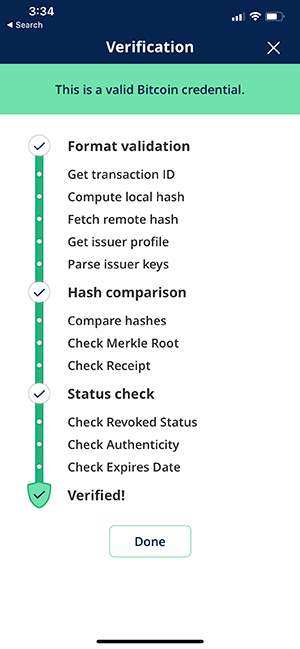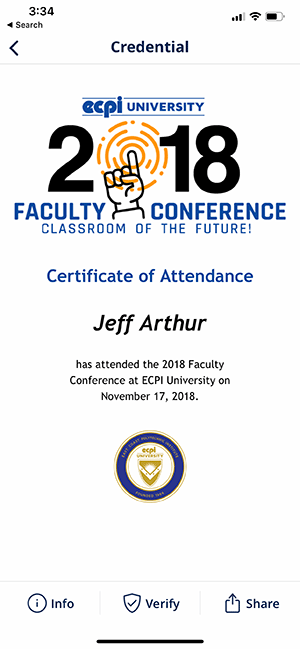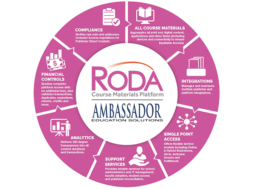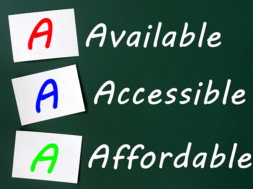
ECPI University Becomes one of the First Universities to Issue Degrees Digitally
Written by Barbara A. Schmitz from an interview with Jeff Arthur, Vice President of Regulatory Affairs & Chief Information Officer, ECPI University
ECPI University, or East Coast Polytechnic Institute, became one of the first universities in the nation to issue degrees digitally, providing secure, immediate verification to prospective employers and others. In 2019, ECPI University plans to expand use of this technology to issue digital transcripts as well, according to a school official.
Jeff Arthur, ECPI vice president of regulatory affairs and chief information officer, said the digital verification is offered through use of blockchain, a continuously growing list of records that are linked and secured using cryptography.
Each block contains a cryptographic hash of the previous block, a timestamp, and transaction data.
“I read an article on MIT’s innovative use of blockchain technology to issue digital degrees, and it made so much sense, but I wondered how much time and resources we would need to dedicate to building a platform to issue our degrees this way,” he said. So Arthur contacted Learning Machine, the same company MIT had partnered with to develop blockchain anchored records, and learned they had an efficient and cost-effective solution.
“They also shared our vision on how this should evolve to be a revolutionary game-changer for higher education by putting ownership of student records into the hands of students,” Arthur said. “Records can be shared the same way you share photos and any other document from a smartphone or computer, including a URL link. The potential to develop efficient, automated processes using these records is really exciting.”
So how does blockchain technology work? Arthur said the technology can transfer ownership of important information such as academic records to their owners in a way that can be proven safe, secure and authentic without requiring the creator of the records to intervene.
 It basically “hits” the institution’s server or the institution’s agent’s server, such as Learning Machine, which then responds, Arthur said. “Then it goes through a whole checklist of transactions … to verify it. It gets the transaction ID, computes the local hash, looks at the issuer keys, and basically comes back and (does a) status check. It checks authenticity and expiration date, and then it ends with a verified indicator, and the proof is in the domain that it’s hitting, that it’s actually the issuer’s domain, or whoever the official holder of the record is.”
It basically “hits” the institution’s server or the institution’s agent’s server, such as Learning Machine, which then responds, Arthur said. “Then it goes through a whole checklist of transactions … to verify it. It gets the transaction ID, computes the local hash, looks at the issuer keys, and basically comes back and (does a) status check. It checks authenticity and expiration date, and then it ends with a verified indicator, and the proof is in the domain that it’s hitting, that it’s actually the issuer’s domain, or whoever the official holder of the record is.”
Cryptocurrency, such as bitcoin, also uses blockchain technology, which is “effectively impossible to hack,” he said. “It certainly is the most prominent use of blockchain today, but blockchain should not be confused with cryptocurrency,” he said. “Data is stored in small blocks of encrypted information that has a key to identify the next block of encrypted data.”
The challenge for most institutions in implementing this system is understanding and trusting the technology, Arthur said. “Colleges have personnel that deal with transcript requests; usually they charge a fee, which sometimes means significant revenue. This is a technology (that) should change the workloads and status quo of many registrar and admissions office positions.”
Arthur said the decision to go with the blockchain technology was an easy one for ECPI University. “It clearly provides for faster and better service and convenience for students,” he said. “We also feel like it will open the door to greater efficiency, which should translate to lower costs. Students get the greatest value for what goes on in the classroom. It is our goal to always streamline administrative costs so we can keep tuition and debt low for our students.”
Arthur said there really are no cons to using blockchain to issue degrees for students and colleges. “We will continue to issue very nice printed and embossed degrees (that graduates can) hang on their walls,” he said.
If there is one barrier to the blockchain technology, it would be acceptance by higher education officials believes Arthur. “Institutions will need to develop policies on accepting official records anchored on the blockchain. ECPI University understands the technology well enough to immediately accept these digital transcripts as official for evaluation of credits and for having earned degrees required to enter graduate level programs.”
ECPI University started issuing degrees with blockchain in August 2018, and has issued more than 1,000 degrees since then.
“But our plan is to issue up to 50,000 degrees earned by our graduates over the last 10-15 years, to anyone we have an email address for,” he said. “The only barrier, really, is to locate graduates.”
ECPI University students do not need to opt in to receive their degree digitally, this is done automatically once the student has graduated. The university simply exports a file of graduates that includes their email addresses and the degrees they earned.
“You’re talking about a report that takes a few minutes to generate,” Arthur said, adding that they keep track of the dates that students change to graduate status, and then transmit that information to Learning Machine, who takes care of the rest of the process. Arthur said that the Learning Machine platform cost is a small fraction of the cost of printing degrees, plus we will be able to layer in transcripts and other academic records without incurring additional costs.
Students wanting digital credentials need to download a free app called BlockCerts and create an account with a passphrase. Next, students would be sent an email with a link where they can download their earned credentials and store them permanently on any device they wish, Arthur said.
“You have a share button in the app, and you can just hit the share button and then pick the way you want to send it,” he said. “Text message, email, copy and paste, whatever you want to do. Effectively each document has a URL. So if you send it by email, you send a URL link to it. So the recipient … just taps the link and it opens the document.”
 Arthur said they recently held their annual faculty conference and exposed all faculty members to the process by having them download BlockCerts to their smartphones, and then sent them a certificate of completion for the conference. “Each of them now has a credential they can share, post to Facebook, provide a URL to view and verify the validity of the certificate documenting their completion of our faculty conference,” he said. “It was the best way for them to experience the practical application of blockchain academic credentials.”
Arthur said they recently held their annual faculty conference and exposed all faculty members to the process by having them download BlockCerts to their smartphones, and then sent them a certificate of completion for the conference. “Each of them now has a credential they can share, post to Facebook, provide a URL to view and verify the validity of the certificate documenting their completion of our faculty conference,” he said. “It was the best way for them to experience the practical application of blockchain academic credentials.”
Arthur said that while it may take longer than he hopes, he foresees high schools adopting the blockchain technology. “Imagine how high schools adopting this technology could revolutionize the college admissions process,” he said, noting they could instantly receive and acknowledge high school transcripts as proof of graduation.
“Additionally, I can see a time in the near future where students can ‘share’ their digital college transcripts and have instant transfer credit evaluations and degree audits,” Arthur said. “Colleges will be able to build applications to evaluate high school records, military service transcripts and college transcripts all at once against a program of the prospect’s choice, and get an instant degree audit with manual review processes only on an exception basis.”
Blockchain technology will also streamline onboarding for employers, providing instant verification of education claims on resumes, he said. “I really think it’s going to be a great benefit to employers who traditionally have relied on what somebody put on his or her resume as being accurate.” The burden of verifying everything on a resume is considerable, and many companies just forego it, he said.
If you have a graduate who said he or she was on the dean’s list for three semesters and earned this degree, you could quickly verify that information. “I think you might move that candidate up the list a little bit compared to somebody who was more difficult to verify his or her claims,” Arthur said. “I think the fact that our graduates can have information on their resumes substantiated raises their status with employers, or their employability or their position in line for a particular job.”
Arthur predicts that within three to five years, over half of the colleges in the country will be issuing degrees on blockchain, and maybe transcripts, too. “Once we and a handful of others do it, you’re going to hit a tipping point where everybody has to do it,” he said. “Think about high school admissions, the process to document high school credentials for the admissions process. If you want to get ahead of other universities in being able to recruit high school students, you’re going to … want to embrace blockchain.”
Arthur said he believes blockchain should also be embraced by state authorizing entities, and perhaps even by the U.S. Department of Education.
“As the landscape of education evolves, these entities are often challenged with management of academic records,” he said. “By far the most common records needed post-attendance are verification of degrees, verification of high school graduations, and academic transcripts. Those records could all be held directly by the owner of the record rather than relying on the issuer.
“How often do we struggle to try and locate a high school to verify someone is a high school graduate, or (encounter) significant delays in getting an official college transcript for the awarding of credits, or to be able to certify military benefits? Way too often,” Arthur said. “Blockchain presents an opportunity to remove those barriers.”
JEFF ARTHUR has been responsible for higher education financial aid and technology management for 35 years, and has implemented and managed robust higher education technology solutions across all functional areas of ECPI University. Jeff has served as a regulatory negotiator in the U.S. Department of Education’s negotiated rulemaking process in the past, and has served on several higher education advisory boards and committees. He is actively involved with legislative, regulatory and Veteran’s education issues and regularly advocates for private sector colleges with all of those constituencies.
Contact Information: Jeff Arthur // Vice President of Regulatory Affairs & Chief Information Officer // ECPI University // 5555 Greenwich Road // Virginia Beach, VA 23462 // 757-490-9090 // Arthur@ecpi.edu // https://www.ecpi.edu/










